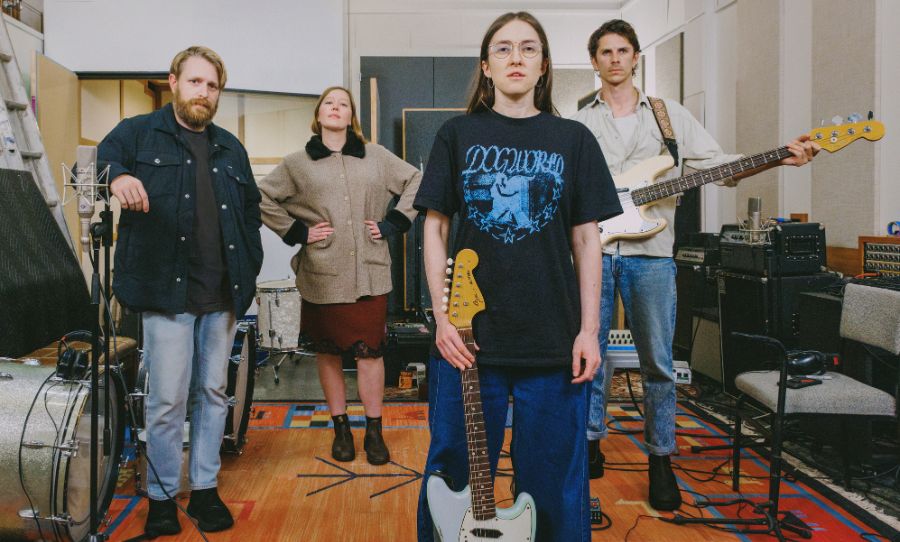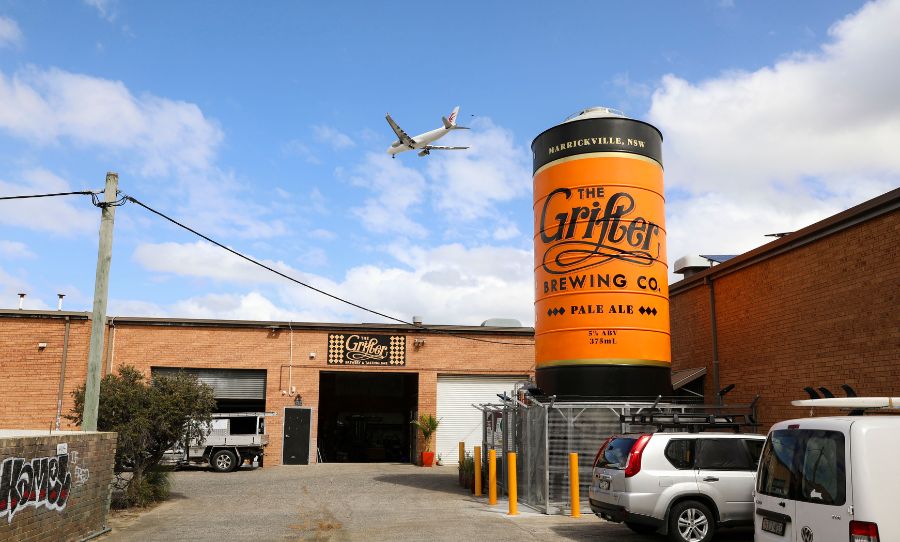Rising stars Nick Ward and Ashwarya took turns interviewing each other about their latest music, tall poppy syndrome, unlikely fashion icons and not doubting your own artistic ability.
Ashwarya explained how the songs within her invigorating debut EP Nocturnal Hours have helped her to understand herself better and how singing in Hindi on her track Biryani led to some surreal fan experiences.
At 19-years-old Nick Ward revealed a maturity beyond his years, expressing complete clarity toward his artistic choices and how he creates the dreamy melancholic sound that pervades his latest EP Everything I Wish I Told You.
Nick Ward interviews Ashwarya
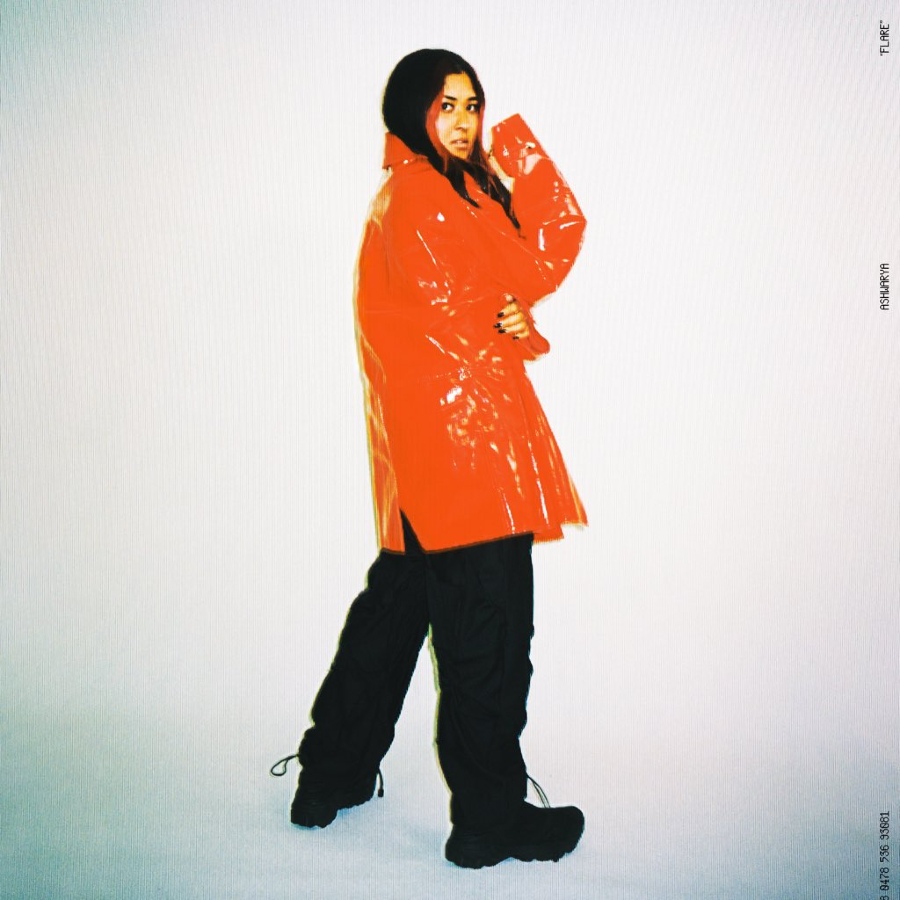
NW: One of my favourite aspects of your music is that you feel like a very realised artist already, and I think a lot of artists like myself have a very awkward first year or two, kind of like figuring out what’s going on, what the branding is and what the visuals look like. But I don’t feel like that’s the case for you. Do you?
A: I think Psycho Hole was the catalyst for me to get a sense of where exactly I wanted to be positioned, and in a really strong way, to the point where I was confident enough in putting that out as my first single too. The visual aspect of things kinda just came along the way. Making visuals is probably the most fun part of the whole process.
NW: It’s a crazy song like structurally it’s really weird.
A: Oh, yeah, when I was in the middle of writing it, I was really keen to see where it went. I felt this sense of excitement that I hadn’t experienced before when it came to my own music and I’m glad that it was my first track. It’s a nice reminder for me to look back at it so that I can stay focused on my vision.
NW: Most of your music has been released during lockdown. Do you think that that’s given you an advantage going forward, because you’ve been so self-sufficient with all the work? Or do you think there’ll be an adjustment period if the music industry returns to normal?
A: I think yes and no. Yes, in a way – it’s helped my mentality towards music because I’m so closed off in a sense that I don’t see people in real life, so I don’t compare myself too much to what’s going on. I just kinda do my own thing. I think if we were in a normal world and I was constantly out and about as a new artist, I’d be overthinking everything a lot more.
NW: The distance from your peers might be good, I guess.
A: Yeah exactly, I’ll be listening to these mega icons like Tyler, The Creator and think it’s all attainable because you’re in your bedroom and your reality is so different. I think if it was open, I would just be self-doubting myself, which I still do sometimes but it could be more.
NW: How did your school experience and your childhood impact your music?
A: I’m an only child, so I was kind of like the sweetheart of the family. I think all the attention somehow gave me enough confidence to go out and perform as a kid but as artists, we’re all a little narcissistic by nature. I grew up spending a lot of time with my grandparents and they were some of the best years – learning from them. My grandma really enjoyed music and dance and encouraged me to do the same. I was so happy in primary school, but high school was such a… what’s the word?
NW: Like when you’re in a bubble?
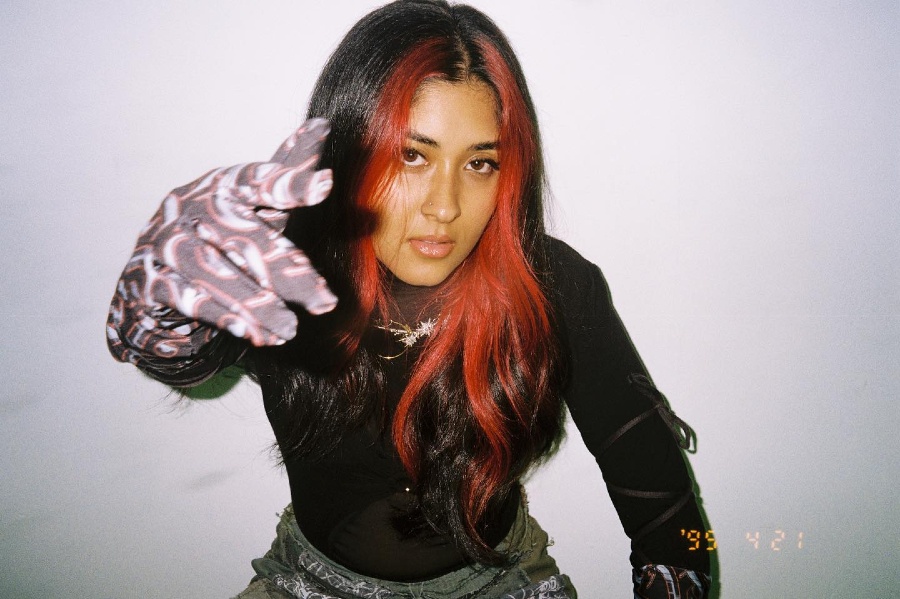
A: Yeah exactly, I feel like my whole high school experience felt like I was just being moulded into this kind of person that couldn’t fully back my creativity whilst in the confines of school.
NW: Is that something that came after high school or were you doing it kind of throughout high school but just in secret?
A: I joined a music school outside of high school, which was like my outlet.
NW: Every artist who isn’t a straight white guy gets asked about their identity in interviews as if it definitely factors into the creative process. Do you think that your identity should play a role in how people consume your music?
A: I think it depends on the artist and the person. There are so many factors that play into how people connect with an artist and I don’t always think it has to do with identity. It can just be purely music. I guess you can argue that fact that your music is your identity or at least an extension of it. I think living in this day and age, everyone just wants more. Which is hard at times because you feel like you’re giving so much away but most of us like to know the deeper things, like If I watch a film that I really like, I’ll research the story behind how the film was made and how the characters were formed to then watch interviews. So I get the intrigue behind wanting more than just music and fully understanding the identity of an artist.
NW: What part of creation do you look forward to the most?
A: There’s a moment that comes when you’re song writing and you realise the song is now yours. It feels right and everything’s coming together. That’s probably the best moment of realisation and excitement. The start of song writing sucks but it’s worth it when you get to that moment.
NW: Other things that you’d like to write more about in the future?
A: So far I have written about my own mental state but I want to start writing more about my experiences. I guess, I haven’t really touched on that yet. At the moment it’s very ‘main character energy’ or whatever you wanna call it, but as cliche as it sounds – it helps me understand myself better.
NW: This is like a three tier question. You played your first headlining shows earlier this year. What was the best, the worst and the most unexpected thing that happened?
A: Best part was literally the whole night. Every part of it was unreal, being my first headline show but also being so deprived of live music in the pandemic was rough, so it made it even more electric and special. Nothing was bad but the most unexpected part was when people were singing the Hindi parts of my song Biryani.

NW: Would you say that you’re a pessimist or an optimist?
A: As much as lockdown has killed a lot of my positivity, I’d still say I’m an optimist, but that stems from the place of me being more of a dreamer than a realist.
NW: What does success look like to you? Is there an image or a sentence that comes to mind?
A: I think success for me is just this mental state of contentment. Which is messed up because I think as artists, and I guess as people in general, we’re always looking for the next thing or how to better something so I guess my idea of success is probably not very realistic lol.
NW: What’s a quote that you think more people need to hear?
A: Just follow your gut instinct. Being in the music industry initially, I would listen to every single person and think that my instinct and intuition need to be put to the side because there are more experienced people who know better. But that’s absolutely not the case. You know yourself best. Plus, whatever decision that you’re going to make – you have to live with it.
Everyone’s relying on you as an artist, from your audience to your team to your friends and family. Just do what feels right for you and at the end of the day, our music is an extension of us so don’t let anyone tell you otherwise.
Ashwarya interviews Nick Ward

A: I just wanted to start off by asking you, how are you doing?
NW: I’m doing good. I’ve got music coming out soon. Just wrapping up a big project that I’m feeling good about. I feel like I had a few months where it felt like I had nothing to do. There was no light at the end of the tunnel; I was just in lockdown, we had no dates locked in – just in limbo, you know? So now it’s like, OK, everything’s starting – I know everything I’m doing until, you know, a certain point next year.
A: As I’ve already mentioned to you before, I love the new hair. Does it represent anything for your future project or more just a style thing?
NW: Thank you! There’ll be music videos that have factored into this decision – but it was almost just like a method acting type thing. I was like, ‘Maybe if I changed my appearance, I’ll feel like everything’s new again’, and the project is a lot about change, trauma and fluid identity and essentially who you can be to other people. I know some people, when they go through a break-up or whatever – something traumatic – change a lot about themselves, their appearance and their habits or where they live or whatever. It was also kind of like – ‘Do I care more about my appearance, or about the art?’. So – on the record – I care more about the art than looking like a clown.
A: You are pretty much a one-man-package, which is epic. Do you feel like your upbringing, or the fact that you grew up in Australia, means you tend to downplay your talents?
NW: Yeah, I guess it’s a tall poppy syndrome thing and it’s also like, yeah, if I say something self-deprecating, someone else can’t say it. In terms of my childhood, my parents have always been really supportive of what I was doing. My twin brother told them he wanted to do piano lessons. I think we were like five or six, and they put us straight into piano lessons. Anytime that we said we wanted to try something – which was usually something art-related – they would always try to foster it as best they could. Having a supportive family has been so important.
A: If you weren’t doing music right now, where do you think you would be?
NW: I don’t know if I’d want to be working in film or something design-related – or on the business-side of music. I do have ideas of what I want to do after I wrap up. I know exactly how many EPs and albums I wanna make. Yeah, I have a plan. Man with a plan.
A: Do you think you’ll ever create a short film?
NW: Probably. I thought I was gonna be a filmmaker before I started making music. It’s my second biggest passion after music, but I feel like anything I will ever do will always be an extension of the whole music thing. If I branched out into acting or filmmaking, it would always come back to Nick Ward, the musician.
A: Do you think that you will ever do a project where you play a character that’s not exactly who you are? Like a part of you that you’re just unleashing or exaggerating?
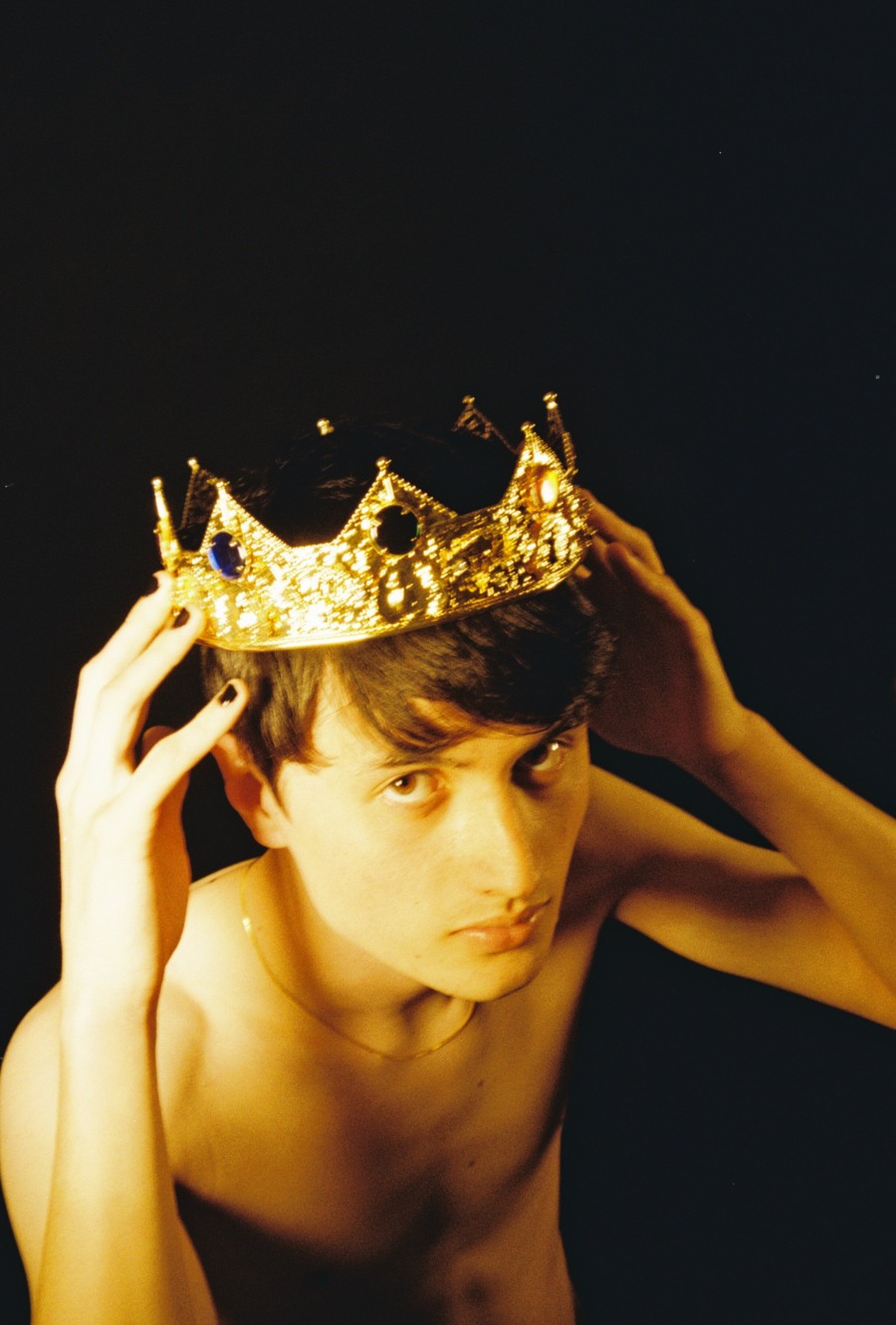
NW: When I started out, I purposely kept my real name instead of using a stage-name. I’m always trying to see how personal and unflattering I can get. I think I still have a way to go, but the writing on this next project contains some stuff I thought I’d never say out loud. The character stuff actually comes up a bit on my next project. I guess it’s like, you know, the ugly monster parts of yourself. Sometimes it’s hard to know who the ‘character’ is, and where each part of yourself starts and ends. That said, I don’t know how much exaggeration there’ll be – it will always be tied to some sort of truth.
A: Favourite film?
NW: I can’t name just one. I’ll say a few: Requiem for a Dream, but then it’s closely followed by Taste of Cherry, In the Mood for Love and Beau Travail. Those are four movies that really made an impact on me. Fuck – La Haine too. They all changed my life. Actually, when I’ve been making music recently, I’ll have a monitor playing a movie on mute – it’s a really fun process. It feels like you’re scoring it and just places it in a context, which is hard to do when you’re so deep in it.
A: What’s the best part about being Nick Ward?
NW: Not many good parts about being Nick Ward, but the best part about being Nick Ward is that I’m very confident in my work, so I guess that’s a pleasant place to be. I don’t know. I’m obviously not always confident all of the time, and I can really doubt myself and I hate what I’m making, but I think that’s normal. You know, when it comes to music, an inflated sense of importance is kind of what keeps me going forward. If I was just really down on myself, I don’t think I would actually get anything done. I’d be crippled by it – and there’s times in my life where I have been.
Yeah, in the last year, I started to realise that it’s not something I need to apologise for, and that being confident and actually loving yourself and stuff is not necessarily an ugly trait. Obviously in moderation, but I think that was something I kind of had to unlearn. When people hail from different backgrounds, genders and sexualities, their confidence is almost seen as a threat to the culture. It’s not just an Australian thing.
A: That’s really true, you really do exude confidence in a way where you come across really assured about what you do.
N.W If you don’t believe in what you’re doing, why should you expect other people to? I think that’s weird. That’s a dickhead move to be like – ‘Hey! I fucking hate what I’m making, but other people will like it, right?’ No – you have to love it. You have to. That’s not hating on people who don’t have confidence in their work – it’s more of a call to action to make stuff that excites you. Release dates are fucking stressful – but it gets easier when you 100% believe in what you’re doing. All my favourite artists feel like they’re trying to make a classic every time they drop something. It’s like, why would you give someone a present to someone that you thought was bad?
A: Do you think lyrics matter?
NW: Definitely, but I’m also maybe not the right person to ask, because I may be a little bit too self-serious at times. I don’t know if I could write a fun song – even FMF! is kinda depressing. The movies that I mentioned before make me feel like shit, and they make me feel almost nauseous, because I’m so immersed and overwhelmed by how sad they are. I feel like that’s sort of the same experience that I’m trying to recreate with my music. I can’t really listen to any of the pre-Everything I Wish I Told You songs because they didn’t have the same goal.

A: The next question – which is a question that we always get asked in interviews – is what’s your process? Do your lyrics dictate where the song heads production-wise or mood-wise, or is it the other way around?
NW: I think it’s the other way round. Usually, at least for these first two projects, the beat has always come first, and then that informs what the song’s going to be about – even though I have a set of themes and stuff I plan to work with. The beat will always influence the rest of the song, and maybe that’s why my songs are very busy – because they’re usually an instrumental for like six months before I write any lyrics to them.
A: How do you know that you’re always on track? Because you’re doing everything from start to finish – do you keep the process to yourself or do you ask people for approval?
NW: Yeah, I always get a little feedback on what I’m doing from people I trust. Sometimes I wish I didn’t have to rely on feedback from others, but I think you just lose perspective when you’re working on something for a really long time. As you know, I’ve been doing all these live listening sessions for my project. I think that’s been such a huge part of this EP – getting all these different perspectives and just putting as many holes through it as possible. Looking at it from all these different angles, through all of these different artists from all walks of life. Yeah, just to make sure it’s been checked out, you know? Maybe I should just trust my own gut more, but I feel like I trust other people more than myself sometimes.
A: Who are your fashion icon/s?
NW: I feel like I’m not a very fashionable guy, but I guess Rei Kawakubo is really cool. Steve Jobs. I don’t know, it’s usually musicians, to be honest, and I feel like maybe that’s only because all the photos and what clothes you’re wearing, ties into the brand. When I’m shopping, it’s usually like – ‘Hey, would this fit in a music video or like a promo video shoot?’
A: Speaking of Steve Jobs, I’ve seen that you’ve made a few nods to him on your social media and I was just curious to know about it all?
NW: Everyone makes so much fun of me, but I read the Steve Jobs biography last year and it really changed my life, which is such an artist cliché. I think he was someone who was so obsessed with integrity and being completely uncompromising. I feel like that’s what I tried to learn from him – is to see things through until they’re completely finished and to make something perfect. Also, always trying to imagine what the experience is like for your audience – he was always so obsessed with the unboxing experience of any product. I just try to apply everything that he said about his products into my music. At the same time, he was a dickhead and a horrible person to be around – so there are some lessons on what not to do, too.
A: First thing you’re going to do when lockdown is over?
NW: [Listing off his hands] Gonna get into some Sydney references, but I’m going to go to the Italian Bowl. I’m going to go to Messina. I’m going to go to the NSW Art Gallery. I’m going to go to the movies– definitely going to support all the local cinemas. I’m gonna see all my friends. Yeah, it’s definitely given us a new outlook on life. I used to be a stay-at-home person, whereas now I would take any chance to go out.
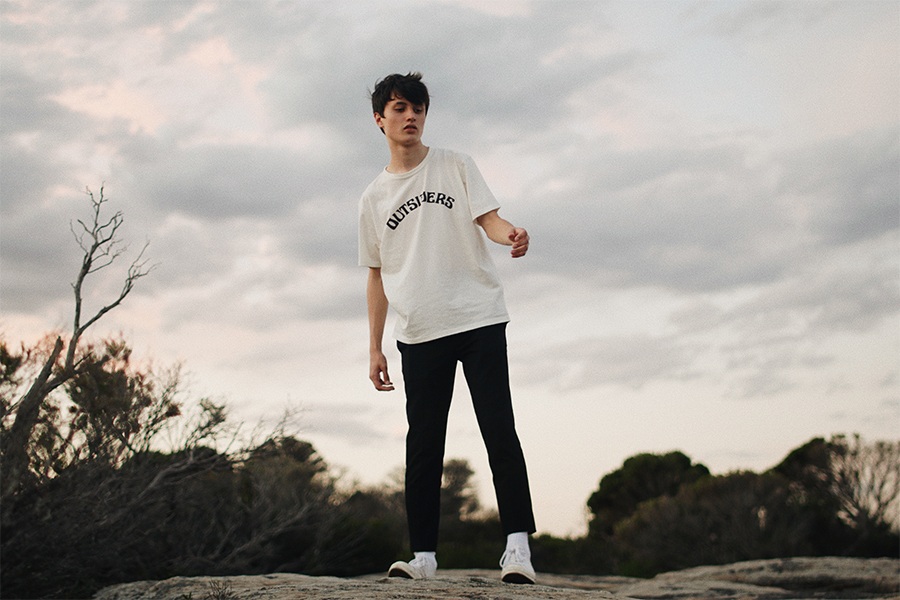
A: Biggest pet peeve?
NW: People who talk over the top of each other. That’s the biggest one. I fucking hate that.
A: Text or phone call.
NW: Depends who it is, I think I prefer phone calls, but I also like how you can kind of consider what you’re saying a bit more over text.
A: Last question, what makes you the happiest?
NW: I think seeing great artists do well. When I see people who really fucking care about what they’re doing – seeing them succeed is the best thing ever. I can’t really say the same for people who don’t seem to care about what they’re doing, but yeah, whatever.
Illustration by @kubism_
Photos supplied

